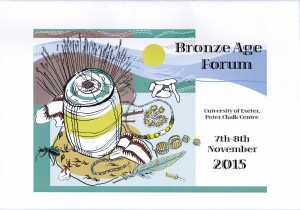On the 7th and 8th November, the Bronze Age Forum came to Exeter. This event, celebrating the ongoing research by Bronze Age scholars across Europe, only occurs once every two years, so it seemed most apt that it came to our University to coincide with the retirement of our own Bronze Age professor: Anthony Harding. The standard, of course, was high and yours truly had the esteemed position of opening the conference – an act of cruelness or kindness by Anthony depending on your perspective! Papers on the first morning were dominated by metalwork, with some fascinating research on Europe-wide projects being discussed by independent researchers from the likes of Berlin University and Oxford Archaeology, as well as larger project teams, from the British Museum and Leiden University.
The afternoon had a much more general focus with papers covering a range of often overlooked material culture and technologies including fire-lighting, bronze moulds, burnt mounds, and fossils (Peter Leeming naturally revelled in grilling the academics in the subsequent discussion!) The final talk came by popular demand from Mark Knight (no relation!) discussing the incredible ongoing excavations at Must Farm in Cambridgeshire where organic material has been preserved to such perfection you wouldn’t believe it’s 3000 years old. A wine reception held in Exeter’s beautiful Guildhall closed the day on a high, with everyone impressed by the stunning architecture inside and the little nuances in the craftsmanship that make that building so unique.
Rested and re-energised, the congregation gathered again on Sunday morning for the next round of research. Crafts and monuments were a dominant theme and we heard about the engagement of digital technologies in understanding prehistoric clays, as well as the impact that developments in geophysics is having in how we might find and interpret monuments. Of particular note is Alex Gibson’s work on henges whereby he engaged a geophysics team from Italy that had 8 magnetometers strapped to the back of a landrover, allowing him to survey 15ha in less than 5 days! It was a fascinating glimpse into the future of our discipline.
The final papers detailed ongoing investigations and excavations into sites and features from Irish hillforts to Iberian stelae, and East England barrowscapes to Hungarian tells. There is truly a spectacular range of projects going on into Bronze Age Europe at the moment and every element is captivating. Whether you’re a Bronze Age scholar or not, it’s an exciting time to see all this research coming to fruition and it was great to utilise the University of Exeter as a platform for it.
For anyone who was unable to attend or feels inspired to find out more about what went on, you can follow blow-by-blow accounts of the talks via Twitter #bafexeter15.
Acknowledgements
Thanks must go to Prof. Anthony Harding for bringing the Bronze Age Forum to Exeter, as well as to all of the students involved in the internal organisation.
Written by Matthew Knight.

